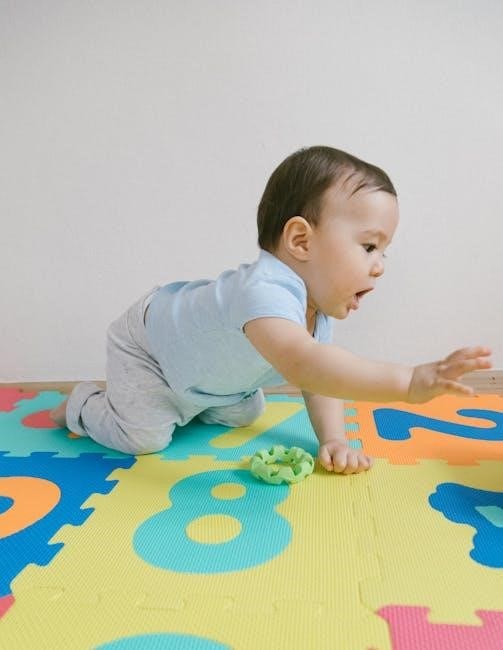The Early Years Foundation Stage introduces seven areas of learning for children, providing a foundation for future education and development, using the EYFS framework and Development Matters guidance and support materials always.
Overview of the Early Years Foundation Stage
The Early Years Foundation Stage is a framework that sets the standards for the learning, development, and care of children from birth to five years old. This stage is crucial in a child’s life as it lays the foundation for their future education and development. The EYFS is used by all early years providers, including childminders, nurseries, and schools. It is based on the principle that every child deserves the best possible start in life and support to fulfill their potential. The framework is divided into seven areas of learning, which are designed to be flexible and adaptable to meet the unique needs of each child. The EYFS also emphasizes the importance of working in partnership with parents and families to support children’s learning and development. By using the EYFS framework, early years providers can ensure that children receive a high-quality education and care that prepares them for success in school and beyond. The framework is regularly updated to reflect the latest research and best practices in early childhood education.
Importance of the 7 Areas of Learning

The 7 areas of learning are essential for children’s overall development, as they provide a broad and balanced curriculum that supports their physical, emotional, and cognitive growth. Each area of learning is interconnected and interdependent, allowing children to develop a range of skills and knowledge that will benefit them throughout their lives. The 7 areas of learning help children to develop a positive sense of themselves and others, form positive relationships, and develop respect for others. They also help children to develop social skills, learn how to manage their feelings, and understand appropriate behavior. By focusing on the 7 areas of learning, early years providers can help children to develop a strong foundation for future learning and success. The 7 areas of learning are also designed to be flexible and adaptable, allowing providers to tailor their teaching to meet the unique needs and interests of each child. This approach helps to ensure that every child receives a high-quality education that supports their individual needs and promotes their overall well-being.

The 7 Areas of Learning
Learning is organised across seven areas, including literacy and personal development, using the EYFS framework and guidance materials always available online for reference and support purposes every day.
Area 1: Literacy
The first area of learning is literacy, which involves the development of reading and writing skills in children. This area of learning is crucial as it lays the foundation for future academic success. According to the EYFS framework, literacy skills include reading, writing, and phonics. Children are encouraged to enjoy reading books, make marks, and learn to write. The EYFS framework also emphasizes the importance of phonics and letter recognition in literacy development. By the end of the EYFS, children are expected to be able to read and write simple sentences, and demonstrate an understanding of basic phonics concepts. The literacy area of learning is closely linked to other areas, such as communication and language, and is essential for children to become confident and competent learners. The EYFS framework provides guidance and support for educators to teach literacy skills in a fun and engaging way, using a variety of teaching methods and resources. Literacy skills are also developed through play-based activities, such as reading stories and singing songs.
Area 2: Personal, Social and Emotional Development
Personal, Social and Emotional Development is a crucial area of learning that focuses on helping children develop a positive sense of themselves and others. This area of learning involves developing social skills, learning to manage feelings, and understanding appropriate behavior. According to the EYFS framework, children should be able to form positive relationships with others, develop respect for others, and learn to cooperate with their peers. The EYFS framework also emphasizes the importance of self-confidence, self-awareness, and self-regulation in personal, social, and emotional development. Educators play a significant role in supporting children’s personal, social, and emotional development by providing a nurturing and supportive environment. By the end of the EYFS, children are expected to be able to express their feelings, needs, and wants, and demonstrate an understanding of social norms and expectations. This area of learning is closely linked to other areas, such as communication and language, and is essential for children to become confident and competent learners. The EYFS framework provides guidance and support for educators to teach personal, social, and emotional skills in a fun and engaging way.

Implementing the 7 Areas of Learning

Implementing the EYFS framework requires careful planning and partnership with families and educators to support children’s learning and development always effectively online.
Using the EYFS Framework and Development Matters
The EYFS framework and Development Matters guidance provide a structure for implementing the 7 areas of learning, with a focus on the Characteristics of Effective Learning.
The framework outlines the skills and knowledge that children should develop at different ages, and provides guidance on how to support children’s learning and development.
Using the EYFS framework and Development Matters, educators can plan and deliver activities that meet the individual needs of children, and help them to make progress in all areas of learning.
The framework also emphasizes the importance of working in partnership with families, and of providing a nurturing and supportive environment that allows children to thrive.
By using the EYFS framework and Development Matters, educators can help children to develop a strong foundation for future learning, and to become confident, curious, and creative learners.
The EYFS framework is used by all early years providers, including childminders, nurseries, and schools, to ensure that all children receive a high-quality education and care.
The framework is regularly reviewed and updated to ensure that it remains effective in supporting children’s learning and development.
Overall, the EYFS framework and Development Matters provide a comprehensive and effective approach to implementing the 7 areas of learning, and to supporting children’s overall development and well-being.
Working in Partnership with Families
Working in partnership with families is a key aspect of the EYFS, as it recognizes that parents and carers are children’s first and most important educators.
The EYFS encourages early years providers to work closely with families to support children’s learning and development, and to share information about children’s progress.
This can involve regular meetings with parents, sharing reports and assessments, and providing opportunities for parents to be involved in their child’s education.
By working in partnership with families, early years providers can gain a better understanding of children’s individual needs and interests, and can provide more effective support for their learning and development.
Families can also benefit from this partnership, as they can gain a better understanding of their child’s education and can be more involved in their child’s learning.
The EYFS provides guidance on how to work in partnership with families, and emphasizes the importance of building strong relationships with parents and carers.
Effective partnership working can have a positive impact on children’s outcomes, and can help to ensure that children receive the best possible start in life.
Regular communication and collaboration are essential for successful partnership working.
The EYFS framework provides a comprehensive approach to learning, supporting children’s development and future education, using guidance and support materials always effectively online.
The 7 areas of learning EYFS provide a comprehensive framework for children’s development, covering essential skills and knowledge. The areas of learning are interconnected, allowing children to develop a broad range of skills.
Using the EYFS framework, early years providers can support children’s learning and development, ensuring they are well-prepared for future education. The framework is designed to be flexible, allowing providers to tailor their approach to meet the needs of individual children.
The 7 areas of learning EYFS are used by early years providers, including childminders, nurseries, and schools, to support children’s development from birth to five years old. By following the EYFS framework, providers can help children develop the skills and knowledge they need to succeed in life.
The EYFS framework is regularly updated to ensure it remains effective in supporting children’s learning and development. The framework is available online, providing easy access to information and guidance for early years providers.




About the author